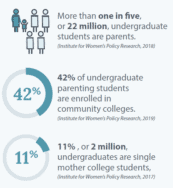Data-driven Action to Support Parenting Students
September 28th, 2023 | Blogs
For nearly two decades, World Education’s National College Transition Network (NCTN) has led the creation of an ecosystem to support college and career readiness for adult learners in the US. NCTN continues to provide training and technical assistance to federal, state, and local adult education agencies to design sustainable transition and bridge program models, develop and scale college and career navigation services, and develop effective partnerships with local colleges to support adult learner enrollment and success.
Increasingly, NCTN works directly with U.S. community colleges to redesign programs and services that better support students previously seen as “nontraditional”, but who might now more appropriately be referred to as “new majority” learners. New majority college students include English language learners, students of color, first generation college-goers, and students with children.
 Single mothers and other parenting students make up an increasing proportion of the postsecondary student population in the U.S., and addressing their needs is essential to equitable postsecondary education and career opportunities.
Single mothers and other parenting students make up an increasing proportion of the postsecondary student population in the U.S., and addressing their needs is essential to equitable postsecondary education and career opportunities.
Education and training have the potential to yield life-changing benefits, financial stability, improved health and well-being, and quality of life for single mothers and their children. With a powerful motivation to improve the lives of their families and set a positive example for their children, many single mothers pursue education and training that will lead to better-paying work and a meaningful career.
To increase the capacity of colleges to meet the needs of parenting students, NCTN’s College Success for Single Mothers project supported data collection for identifying students who are single mothers and implementing targeted action plans. We encouraged participating colleges to collect and analyze data on all parenting students and develop broad-based strategies to support single mothers, with the potential to benefit all parenting students. The report Transforming Data into Action: Fostering College Success for Single Mothers and Parenting Students describes how we did this and the impact it had on parenting students.

Data is a key driver in obtaining and allocating resources to invest in interventions for parenting students. Comprehensive quantitative and qualitative data on parenting students can help to tell the story of their strengths, successes, challenges, and lived experiences. Collecting this data enables colleges to conduct targeted outreach to parenting students about available resources and supports, and assess the results of their efforts. Without data, it is challenging to advocate for parenting students’ needs.

Informed by their data collection, each college developed and implemented an 18-month action plan outlining goals and strategies for addressing the findings and creating sustainable supports for parenting students on their campuses. The colleges are:
Increasing the visibility of parenting students through faculty development sessions, student panels, and other campus programming; and through featuring parenting students in campus media and communications.
Improving the availability and visibility of resources for parenting students on campus and in the community by adding parenting resources to their existing basic needs information, creating resource pages specifically geared towards students with children, hiring student parent “navigators” to provide direct assistance, and more.
Creating spaces and events to welcome students with children, such as changing stations and lactation rooms, offices with children’s books, toys, and crayons , and designated child-friendly study areas.
Creating community for parenting students by providing opportunities to meet and connect with each other outside of class time in student parent learning communities and clubs. In addition to offering affirmation and encouragement, student parents share vital information and resources with each other.
Reviewing policies with parenting students in mind to identify which policies enable or prohibit student parent success. Some colleges are recommending changes to policies that prohibit children on campus, improving compliance with Title IX protections, revising academic policies regarding course registration and withdrawal to accommodate parenting students’ schedules, making support services available during evenings and weekends, and embedding standard syllabus language to proactively recognize student parent concerns.
Improving data systems and developing reliable and sustainable methods for collecting, updating, and reviewing data that informs efforts to support single mothers and
student parents.
Read Transforming Data into Action: Fostering College Success for Single Mothers and Parenting Students to learn more about World Education’s design, coaching, and technical assistance in the College Success for Single Mothers project, and the work of the participating colleges.
The three-year College Success for Single Mothers project was implemented by World Education’s National College Transition Network (NCTN) with funding from ECMC Foundation and in partnership with Achieving the Dream (ATD) and PERG Learning and eight U.S. community colleges.
World Education fosters enduring partnerships across regions and sectors to advance education outcomes for all. We offer education systems strengthening, program design and implementation, applied research and evaluation, capacity development, and policy development services.